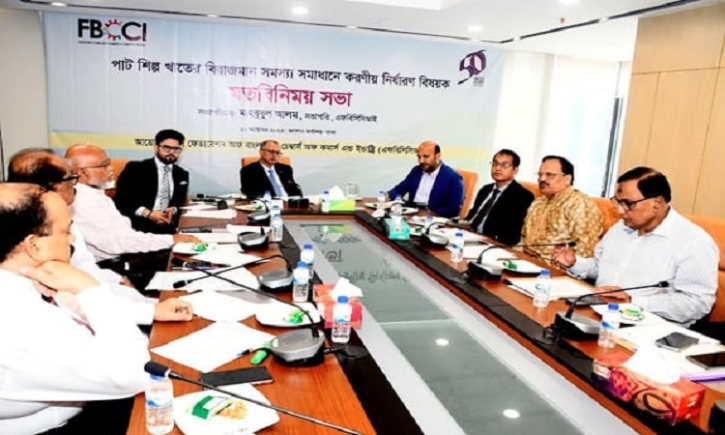Staff Correspondent
Published:2023-10-14 07:37:20 BdST
FBCCI aims to revive golden age of jute industry: Mahbubul Alam
The Federation of Bangladesh Chambers of Commerce and Industry (FBCCI), the apex trade organization of the country, is committed to reviving the historic prominence of the jute industry.
FBCCI President Mahbubul Alam made this call during a dialogue with key stakeholders in the jute sector held on Thursday at the FBCCI office in the capital's Gulshan area.
Mahbubul Alam emphasized the significance of jute in Bangladesh's history and economic growth. He said that the golden fiber or jute is renowned and cherished globally, said a press release.
"FBCCI will collaborate with entrepreneurs in the jute sector, as well as government and private sector stakeholders, to address the industry's current challenges," he said.
Highlighting the industry's historical importance, the FBCCI President added, "Our jute industry has been a cornerstone of our economy, serving as a primary driver of foreign exchange earnings. Even after the independence, the jute industry maintained its glory for several years. However, various factors have led to the gradual decline of this traditional industry.
Initiatives are urgently needed to restore its former glory," he added.
Mahbubul also stressed the need for diversifying jute products to boost exports and announced FBCCI's commitment to providing comprehensive support to entrepreneurs in the sector to create new markets and increase exports.
FBCCI's former vice-president and current director Md. Habib Ullah Dawn, FBCCI Director Md. Abul Hossain, Alhaj Azizul Hoque, Md. Niaz Ali Chisty, Fakhorus Salehin Nahian, and leaders from various jute associations and organizations, including the Bangladesh Jute Mills Association, Bangladesh Jute Goods Exporters Association, Bangladesh Jute Association, Bangladesh Jute Spinners Association, Bangladesh Diversified Jute Goods Producers, Exporters Association, National Skill Development Authority (NSDA), and Bangladesh Handicraft Manufacturers and Exporters Association (Banglacraft) were present at the meeting.
During the meeting, participants from various organizations and entrepreneurs in the jute sector offered several suggestions to address the industry's existing challenges.
These suggestions included: Abolishing the 2 percent source tax on raw jute, implementing the concerned act fully, halting the use of polythene, initiating appeals against anti-dumping measures, designating jute products as agricultural products, establishing a Jute Sector Development Fund (JSDF) to support the industry, providing a 30 percent subsidy for modernizing jute mill machinery, arranging low-interest rate bank loans, adjusting tax rates on jute exports, increasing cash assistance to 20 percent for various jute products, Waiving tax at source on export incentives, Ensuring the supply of high-yielding jute seeds, and improving the accuracy of raw jute production, consumption, and export statistics.
Members of the jute industry expressed their concern about the 2 percent source tax on raw jute affecting farmers and traders, potentially discouraging jute production and disrupting the industry.
They also called for the mandatory use of jute wrapping, as stipulated in the Mandatory Jute Packaging Act 2010, to boost domestic demand for jute products.
Md. Abul Hossain, Chairman of the Bangladesh Jute Mills Association and FBCCI Director, stressed the importance of establishing a Jute Sector Development Fund similar to the Export Development Fund (EDF) to protect the industry.
He also emphasized that providing low-interest loans to the jute industry would encourage mill owners to diversify their product offerings and promote sales and exports in both domestic and foreign markets.
Unauthorized use or reproduction of The Finance Today content for commercial purposes is strictly prohibited.


